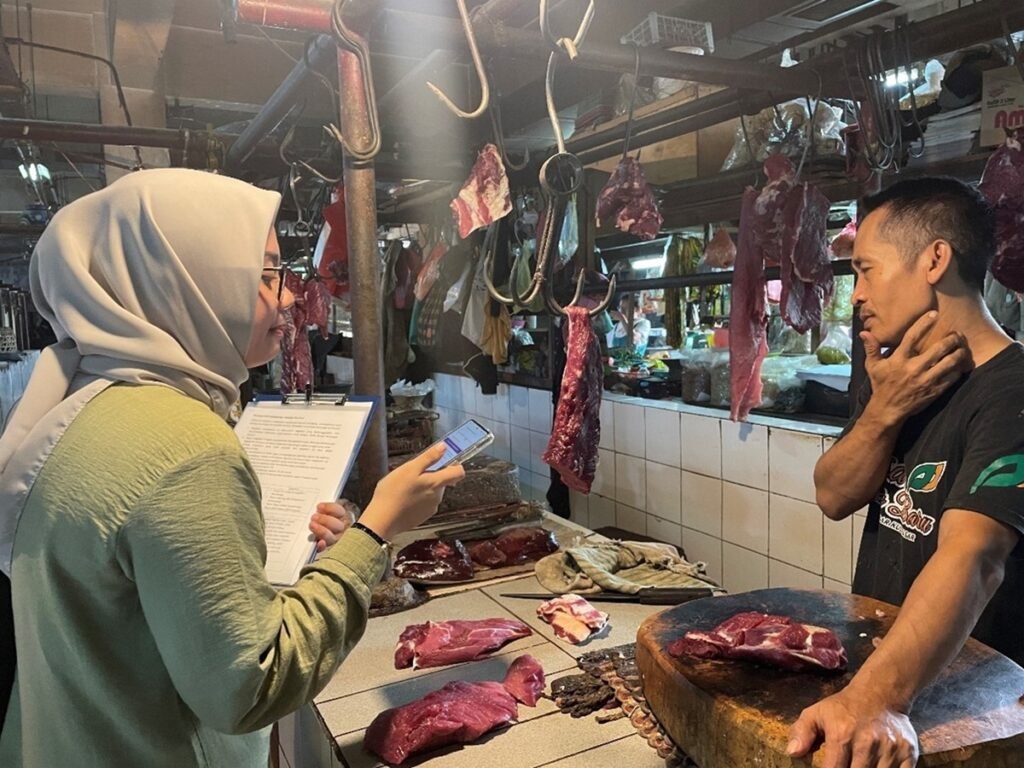
The WHO team promoted “Five keys to making traditional markets safer” to butchers in Jakarta. Credit: WHO/Tri
From August to October 2023, the World Health Organization (WHO) supported a series of activities to improve the safety of traditional food markets in three provinces in Indonesia. The focus of the activities was on improving hygiene standards and protecting the health and well-being of consumers and market workers.
An estimated 16,000 traditional food markets across Indonesia serve as the main source of fresh food and agricultural products for the surrounding areas. In a 2020 survey, the Indonesian Ministry of Health (MoH) found that of 448 traditional food markets in 28 provinces, only just over 10% met health hygiene standards. This increases the risk of foodborne illness transmission and the emergence and spread of zoonotic diseases.
To address this issue, WHO supported the design and implementation of a pilot program in three key locations: Semarang, Bandung District and Samarinda City, based on the WHO’s Five Keys for Safer Traditional Food Markets. The Five Keys provide practical risk mitigation measures and strategies to strengthen risk communication and community engagement. These are designed to benefit the entire market community, including management, staff and the public, and address context-specific challenges.
Using an assessment tool developed by the Ministry of Health, program staff first conducted a comprehensive analysis of the market situation, finding a lack of food safety and health information posters, inadequate water quality assessments, no documented cleaning procedures, inadequate pest control measures, and no procedures for handling live animals. Market workers’ knowledge, attitudes, and practices (KAP) were consistent with the five key approach elements, but some misconceptions were common, such as the belief that washing hands with water alone is sufficient.
Based on these findings, WHO, in consultation with key national stakeholders, developed a range of information, education and communication materials, which were disseminated through stakeholder training, one-to-one consultations with vendors, market launches and social media platforms. A series of post-intervention KAP surveys and meetings were then conducted, which found that the implementation of hygiene standards had improved significantly in each district.

Interactive information, education and communication materials have been developed to impart knowledge through social media platforms and flyers. Credit: WHO
“From this activity, we learned that handwashing has several steps and needs enough time to kill bacteria,” said Ibu Nurul Uwafik, a meat seller at Karangjati Market in Semarang district.Across the three sites, vendors’ knowledge of key hygiene measures increased from an average of 84 percent before the intervention to 90 percent after, and vendors who clean their stalls and floors with water and soap or disinfectant now account for 80 percent, compared to just 70 percent before.
The success of the Five Keys programme highlights the value of evidence-based, targeted interventions that raise awareness, change behaviour and foster collaboration between local authorities, market actors and the wider community.
“Health-focused food markets do more than just promote health; they are essential in promoting a circular economy, where health benefits are seamlessly integrated with the prosperity of the entire community,” said Ens Lin Ibrahim, Bandung District Trade and Industry Officer. “Through the implementation of our five-key approach, we have established important criteria for market design that not only minimizes health risks but also prevents the transmission of zoonotic diseases.”
In the coming months, WHO will support continued capacity building of the market community and continue to collaborate with the Ministry of Trade and Industry and the Ministry of Health on integrating the five key approaches into the SNI Pasar Rakyat to ensure uniform application of food safety protocols across Indonesia and achieve healthier and safer traditional food markets.
Author: Indah Devyanti, WHO National Specialist for Environmental Health and Climate Change in Indonesia

